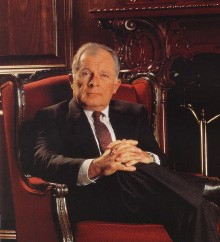F. Lee Bailey

F. Lee Bailey is one of the most famous and controversial lawyers in the United States. Among the notable clients Bailey defended were murder suspect Sam Sheppard, Boston Strangler suspect Albert DeSalvo, publishing heiress Patty Hearst, U.S. Army Captain Ernest L. Medina and football legend O.J. Simpson. However, despite his successes as a lawyer, Bailey’s behavior outside of the court frequently landed him in trouble and ultimately led to disbarment.
In 1960, Bailey was hired to represent George Edgerly, accused of murdering and dismembering his wife in the highly publicized “Torso Murder.” In 1961, the fame that Bailey’s successful defense of Edgerly earned him resulted in his being hired by Sam Sheppard, an Ohio doctor who had already served seven years in prison for the murder of his pregnant wife. Bailey threw himself headlong into the appeals process. Laying the foundations for his reputation as a tireless self-promoter, he also appeared on numerous television programs. (The case itself would inspire the popular television series and film The Fugitive.) By 1966, Bailey would take the case all the way to the Supreme Court, where Sheppard’s conviction was overturned. In the retrial that followed, the physician was found not guilty.
A bona fide celebrity lawyer by the late 1960s, Bailey led a lavish lifestyle and continued to add sensational cases and controversial clients to his resume. In 1967, he unsuccessfully defended Boston Strangler suspect Albert DeSalvo in his trial for a string of sexual assaults. Several years later Bailey represented U.S. Army Captain Ernest L. Medina in a court martial for his part in the My Lai Massacre in Vietnam, during which hundreds of civilians were killed by members of Medina’s battalion. Bailey won the captain an acquittal, and after Medina resigned from the army Bailey gave him a job at his Enstrom Helicopter Company.
Despite his undeniable successes as a lawyer, life was far from perfect for Bailey. In 1970, he was censured in Massachusetts for misconduct; the following year, he was suspended from practicing law in New Jersey. Then, in 1973, he was tried for mail fraud. Though eventually acquitted, Bailey followed that case with his unsuccessful 1975 defense of Patty Hearst in her trial for bank robbery. Widely considered as having botched his closing arguments, Bailey experienced something of a lull in his legal career, though he remained in the public eye by touring the lecture circuit, appearing on television and writing several books. Bailey returned to court in 1982, but this time to stand trial himself for drunk driving. He was successfully defended in his case by Robert Shapiro, with whom he later worked on the most important trial of his career.
However, more trouble stood between Bailey and his return to the limelight. Following two liens placed on his income by the IRS for underpayment of taxes, Bailey was hired by Claude Duboc to defend him on charges of drug smuggling and money laundering. Bailey ultimately negotiated a bargain in which Duboc pleaded guilty and agreed to turn all of his assets over to the government in exchange for leniency. However, when the time came for the government to collect, it came to light that Bailey had held on to millions of dollars’ worth of Duboc’s stocks and had used the proceeds from their sale to pay for personal expenses unrelated to the trial. Bailey was found in contempt of court and spent six weeks in jail before finally returning the money.
Whatever bad press Bailey’s handling of the Duboc trial might have earned him, it was surely dwarfed by the media storm surrounding the case for which Bailey is best known—California v. Orenthal James Simpson. In 1994, Bailey joined Robert Shapiro, Johnnie Cochran, Barry Scheck and Robert Kardashian to form the core of the so-called “dream team” of lawyers hired to defend football legend O.J. Simpson in his trial for the murders of his wife Nicole Brown Simpson and her friend Ron Goldman. The “trial of the century,” as it would become known, began in January 1995 and was among the most publicized in history, followed by millions around the world.
For his part, Bailey was placed in charge of a team of private investigators that conducted exhaustive research into all aspects of the case. This research would prove critical when it uncovered evidence of the racist leanings of LAPD Detective Mark Fuhrman, whose testimony was crucial to the prosecution’s case. Coupled with his three-day cross-examination of Fuhrman, Bailey’s introduction of this evidence into the case completely obliterated the detective’s credibility as a witness and is considered a significant factor in Simpson’s acquittal. In one of the most famous images from the trial, from October 3, 1995, Bailey is seen standing at Simpson’s side as the jury reads the verdict “not guilty.”
In 2001, his handling of the Duboc case led the Florida Supreme Court to disbar him in the state, and two years later Massachusetts followed suit. Stripped of his ability to practice law, in 2010 Bailey settled in Yarmouth, Maine, where he established a consulting firm. Though he passed the bar in Maine two years later, his application for a license to practice was denied by the state’s Supreme Court, which cited Bailey’s remorselessness about his past actions as its primary reason for the rejection. Bailey’s subsequent appeals to the ruling have been unsuccessful.



